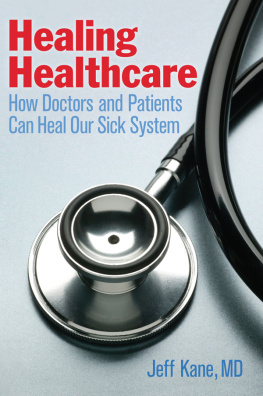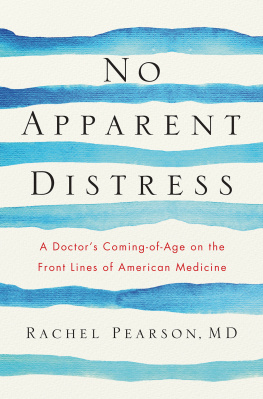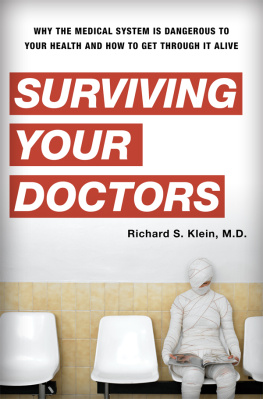Praise for How to Get the Right Diagnosis
If you, or one of your loved ones, has a complex, chronic illness, you need to read this book. You are not alone if you fear your medical problems are misunderstood. This book, written by an analyst of the highest caliber, Randolph Pherson, teaches you how to take charge of your own healthcare in an organized, structured way. As a physician, I am happy to give my strong endorsement to Mr. Phersons advice that you need a doctor who will spend time with you and will look for root causes of symptoms. Follow Phersons advice: if both the doctor and the patient ask a lot of questions to get a complete picture, then, chances are, you will discover the true diagnosis.
Dr. Jeanne Shiffman , Well BeingBeing Well, Integrative and Family Medicine
Mr. Pherson deftly applies his decades of experience practicing, developing, and teaching the art of intelligence to the life and death issue of accurate medical diagnoses. He goes beyond the message that patients must advocate for their health to provide a practical roadmap for partnering with medical professionals to solve non-obvious medical challenges. His book is a must read for medical professionals to ensure they are challenging their assumptions and considering alternative scenarios. But more importantly, it is a must read for anyone facing a seemingly undiagnosable, but potentially life-threatening medical issue.
Fran Moore , former Director of Intelligence, Central Intelligence Agency
Doctors want to be thought of as all-knowing, but they cannot be all-knowing, since the screening testing they prescribe often leaves a large level of doubt. Physicians should offer more information to the patient specific to that level of doubt, but often, they do not take the time to explain false normals that can occur at rates as high as 20 percent. Randys story is a great example of why all of us, as patients, need to demand full disclosure on all medical testing and insist on clear answers about tests that are not perfect.
Doug Boyink , MD, Fellow, American College of Emergency Physicians
Randolph Phersons distinguished career as a senior intelligence officer and author has had a significant impact internationally on the professionalisation of analysts working in national security and law enforcement. This time, he applies, in a novel and personal way, the critical thinking and tradecraft knowledge he has gained in the intelligence world to improving the diagnostic skills of the medical profession. The book is a must read for an increasingly time-starved and hyper-specialised medical profession and a useful resource for patients seeking better health advocacy with their doctors.
Patrick F. Walsh , Associate Professor, Charles Sturt University, Australia
How to Get the Right Diagnosis
Also by Randolph H. Pherson
Structured Analytic Techniques for Intelligence Analysis, 3rd ed., Randolph H. Pherson and Richards J. Heuer, Jr., Washington DC, CQ Press/SAGE Publications, 2021.
Critical Thinking for Strategic Intelligence, 2nd ed., Katherine Hibbs Pherson and Randolph H. Pherson. Washington, DC: CQ Press/SAGE Publications, 2017.
Cases in Intelligence Analysis: Structured Analytic Techniques in Action, 2nd ed., Sarah Miller Beebe and Randolph H. Pherson. Washington, DC: CQ Press/SAGE Publications, 2015.
Handbook of Analytic Tools and Techniques, 5th ed., Randolph H. Pherson. Tysons, VA: Pherson Associates, 2019.
Analysts Guide to Indicators, Randolph H. Pherson and John Pyrik. Tysons, VA: Pherson Associates, 2018.
Analytic Briefing Guide, Randolph H. Pherson, Walter Voskian, and Roy A. Sullivan, Jr. Reston, VA: Pherson Associates, 2018.
Analytic Production Guide, Walter Voskian and Randolph H. Pherson. Reston, VA: Pherson Associates, 2016.
Analytic Writing Guide, Louis Kaiser and Randolph H. Pherson. Reston, VA: Pherson Associates, 2014.
Intelligence Communication in the Digital Era: Transforming Security, Defence and Business, Rubn Arcos and Randolph H. Pherson, editors. London: Palgrave Macmillan, 2015.
Rethinking Intelligence: Richards J. Heuer, Jr.s Life of Public Service, Richards J. Heuer Jr., Randolph H. Pherson, editor. Tysons, VA: Pherson Associates, 2018.
To order any of these publications, go to:
shop.globalytica.com/collections/publications
How to Get the Right Diagnosis
16 Tips for Navigating the Medical System
Randolph H. Pherson

Mango Publishing
Coral Gables
Copyright 2020 Randolph H. Pherson
Published by Mango Publishing, a division of Mango Media Inc.
Editor: Freesia McKee
Cover Design: Adriana Gonzalez
Layout and Interior Design: Jermaine Lau
Mango is an active supporter of authors rights to free speech and artistic expression in their books. The purpose of copyright is to encourage authors to produce exceptional works that enrich our culture and our open society. Uploading or distributing photos, scans or any content from this book without prior permission is theft of the authors intellectual property. Please honor the authors work as you would your own. Thank you in advance for respecting our authors rights.
For permission requests, please contact the publisher at:
Mango Publishing Group
2850 Douglas Road, 2nd Floor
Coral Gables, FL 33134 USA
For special orders, quantity sales, course adoptions and corporate sales, please email the publisher at or +1.800.509.4887.
How to Get the Right Diagnosis: 16 Tips for Navigating the
Medical System
Library of Congress Cataloging
ISBN: (p) 978-1-64250-176-6 (e) 978-1-64250-177-3
BISAC: MED074000, MEDICAL / Physician & Patient
LCCN: 2019948634
Printed in the United States of America
To those in the 5 percent club who died not knowing they were members.
Table of Contents
Foreword by
Sandy Ibrahim, MD
In medical school, one of the questions I was taught to ask a distressed patient was, Do you have a sense of impending doom? What a silly thing to say, I thought. Who even talks like that? I have labs and tests that will answer that question better. ECGs, for example, can tell me much more than a patient could ever relate. I practice in the nations capital, and it is easy to send a patient down the street for fancy imaging, nuclear tests, or even the million-dollar workup, paid for by his insurance.
That being the case, why would I ask such a ridiculous question? Why would I put my diagnosis at the mercy of a patients answer to this outdated textbook question? Who would know best? The patient or a trained physician?
By the time Randy Pherson walked into my office, I had run out of diagnostic testing options that would explain his ever-persistent shortness of breath. We had spent five years exhausting the pathways of modern medicine. I had sent him to multiple specialists who ordered scores of diagnostic tests and prescribed multiple treatments. Unfortunately, every path led to a dead end. So, I fell back to asking that old school question: Does Randy exhibit a strange sense of impending doom?
Asking that question likely saved his life that day. Randy was tired, frustrated, and at the end of his rope. His face had that look of impending doom, which I had learned about but never encountered until that day. I told him to drive immediately to an emergency room. He protested, saying he would go right after two appointments that afternoon. I countered in no uncertain terms: You must pick a hospital and drive there now. Non-negotiable.
Over the course of my career, I learned that no matter what diagnostic tools doctors have at their fingertips, the most important route to effective treatment is old-fashioned face-to-face communication, eye contact, and spending quality time with your patients. Specialists should treat the patient, not just order and process test results.
Next page








